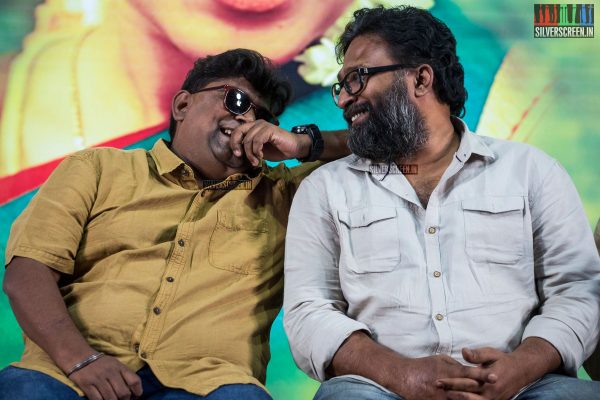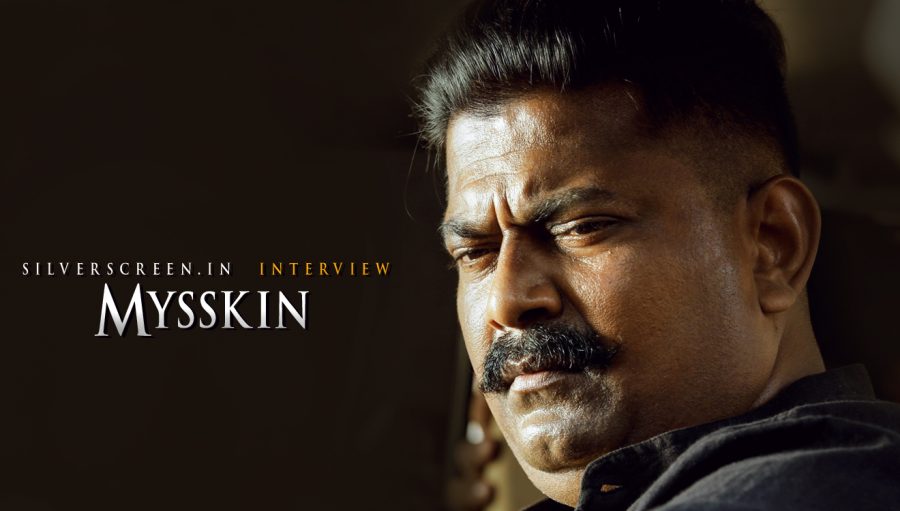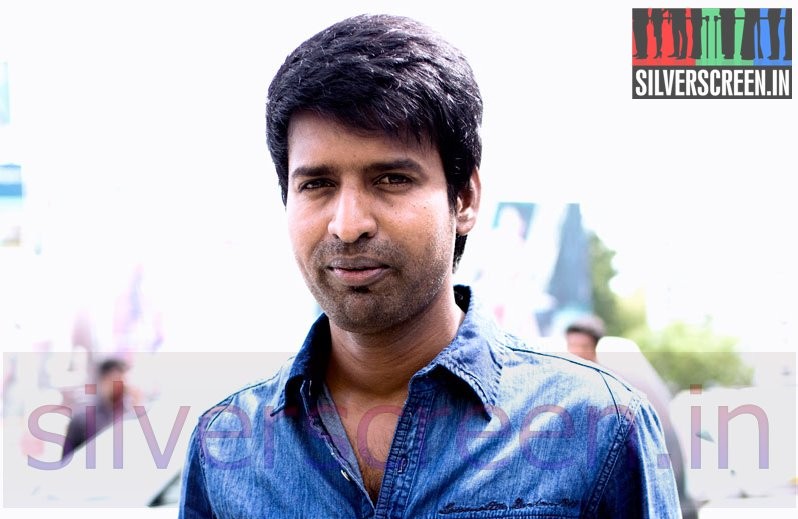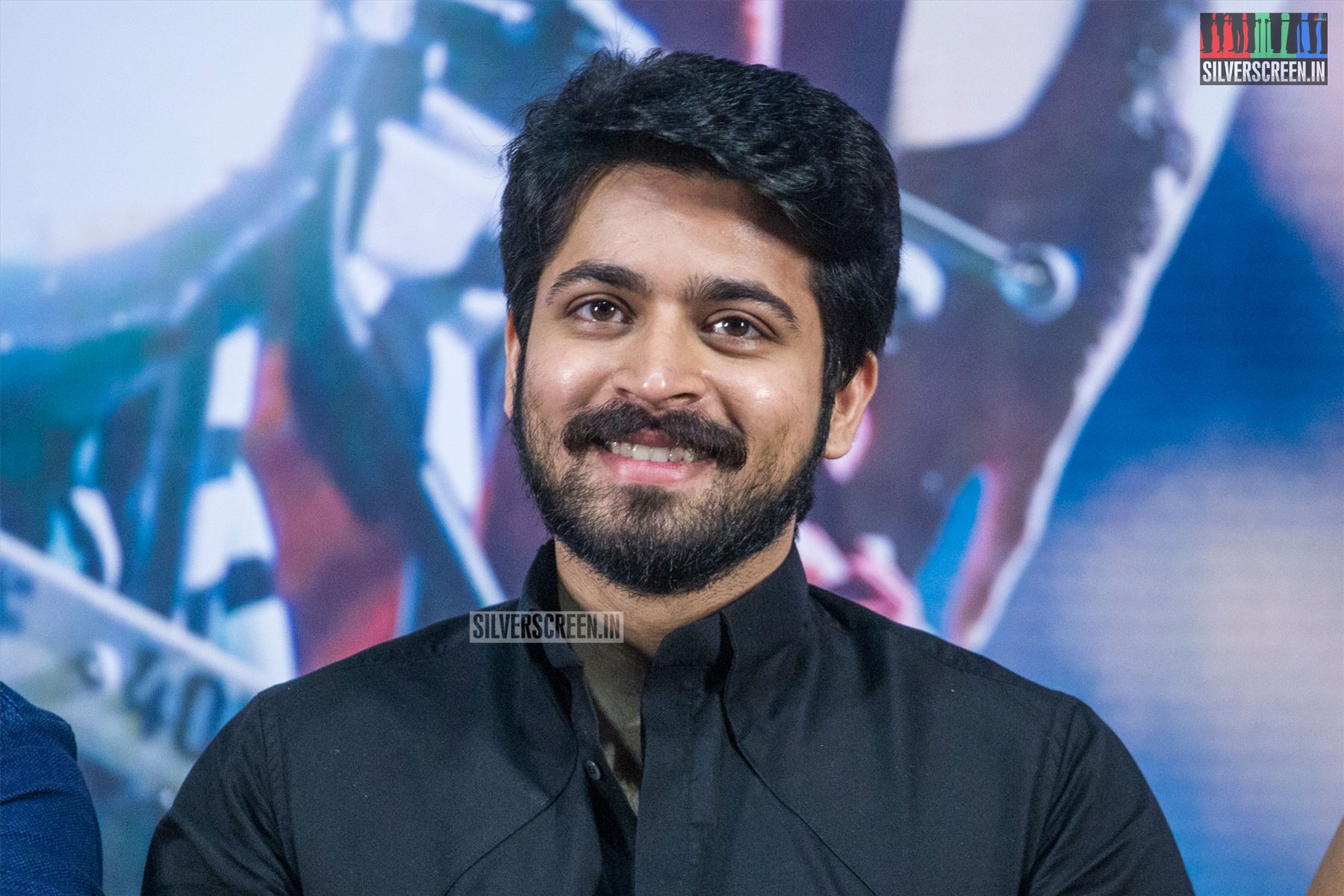Mysskin may have traded his dark glasses for some light, but he’s still not lost his penchant for tangential philosophy – and those metaphors. If his brother – and director of Savarakathi – Aditya, is a river, he calls himself a bank.
The other bank, he says, is director Ram, fellow actor in Savarakathi.
If you’d met director-actor Mysskin a few years ago, you would have found it impossible to peer into his big, expressive eyes. They were always hidden behind a pair of sunglasses, as if he did not want the world to see what he felt. But Mysskin was a talker even then, the kind who left you pondering for days about his philosophy. The one thing missing in that package was humour. You knew you were in the presence of an auteur who flirted with the dark, and loved creating characters with flaws.
Now, he’s bid goodbye to the glasses, and welcomed the light back into his life. In the teaser of Savarakathi which releases tomorrow, his smile lights up his face, and his eyes grow bigger when angry. He sounds happy, even cheerful, and a conversation is a two-way path. The philosophy, thankfully, remains.
Excerpts from an interview with the director, who acts under the direction of his brother GR Aditya, and with fellow director-actor Ram in Savarakathi. Of course, there’s talk of reading. For, you can’t place Mysskin in a world without books.
You sound cheerful, quite a departure from your earlier days…
I think I’m growing old, maturing. Having seen all suffering in the industry and in life, now everything seems very ironical. You cannot avoid suffering and sadness; you have to overcome it with laughter. Like how the protagonist of any movie has a conflict, in real life too, each of us goes through that. And, [the] understanding of reality comes only when we experience life’s hardships. So, now, I have lightened up.
Is removing your sunglasses a step in that direction?
Perhaps it has to do with my age. When we enter the industry, we want to protect ourselves, our identity. Now, I guess I can say I have nothing to hide. I started wearing my glasses to cut out brightness; I needed it to work. At night, I wore it to cut out the high beam on roads. Then, it became a trademark of sorts. Was it also fear that people would see me for what I was? I’ve always been very animated. When people see my eyes when I speak, they would think I am exaggerating or being theatrical. I’ve always been intense, but the coolers had people presuming I was indifferent. Now, they see the real me.

You’re known for your intense films. The humour, if at all, is but a sliver. How was it writing a light, frothy film?
Actually, when my brother asked me to write the script, the only condition was that it should be humorous. My movies usually only have a sprinkling of dark homour. It was very difficult to make the switch, but then I always believe that every dark scene, if turned around, will turn into humour. For instance, if you look at Charlie Chaplin’s movies, if anyone else had starred in them, they would not be humorous.
At one level, writing a humorous film was not very difficult because I am a jolly person who happens to extensively read humorous literature. But, the image built around me is that I am a very serious person.
I believe the best stories are humorous. Mulla Nasruddin Hodja, Tenali Raman, Birbal… the great humourists I grew up reading. If you revisit my movies, you’ll see that irony shines. So, I’m very grateful to my brother for pushing me into writing something so different.
Any great story should have a conflict. It depends on the wants of the protagonist and antagonist. Savarakathi is about a vicious loan shark driven by anger, and a barber who holds on to lies to escape. The whole movie sees them chasing each other.
When you acted in Nandalala, you said that you took it up because no one else was keen to do the role? Are you now more comfortable with the idea of acting?
Let’s put it this way. I always try to score 36 marks, just enough to pass. That’s because I believe that the role of an actor is to do a scene and leave it, never linger. An actor must never have to prove that he/she is an actor. That said, if a script is properly aligned, you don’t really need actors to hold a scene together. If they merely stick to the demand of the script, the scene will turn out to be a powerful one.
I believe that despite being on the heavier side, I am a very flexible person. My body is expressive. It helps me as an actor, to possibly score a little more than 36! But, it’s never been a desire to consolidate myself as an actor.
You love speaking, but your dialogues are crisp, never indulgent.
Once I write my dialogues, I take a red pencil and start marking out anything that’s beyond six lines. It means the character is lying, trying to justify his/her action. I might have written the dialogues, but when I take the red pencil, I am the director. I only retain what I want.
What’s your strong point as a director?
Let’s say casting. If you cast against the grain and cast right, you will automatically succeed. For instance, casting Radha Ravi as a good man in Pisaasu. That creates a conflict in the viewer’s mind, and after that he/she only sees the father, not the actor playing that role. I like to lend my actors a specific body language. Like the one Prasanna had in Anjaathey. He had limited dialogues; I wanted people to look into him, not merely watch him. A good movie is always high on silence. It gives space to peer into the heart of the story and not merely focus on the screen.
You are known for your band of dedicated assistants… How does it feel to be a mentor?
I decided I would be in a happy space even though I’ve always courted solitude. My brother is a clown and deeply funny. My assistants are like my children; they are always with me. Whatever I eat, buy… I share with them, they reciprocate with love. In my office, love and compassion are taught first. Even today, when I meet my gurus Kadhir or Vincent Selva, I touch their feet. And, I’m strict with my team, I want them to be there for the art, not the money.
What’s your process of creation like?
My rumination as a creator goes to the level of obsession. I forget to eat, bathe, meet people. Of that suffering, art is born. That’s why art is so precious. These 15 years, I’ve slept only at 2 am, I’m drowsy most mornings, but I don’t want to miss one moment more than is necessary; 24 hours are not enough.
Your love for books is well known. So is your generosity in handing out books to those interested.
Recommended
I’ve been a bibliophile for nearly three decades. I collect books, I love reading. But, if I don’t share what I read, if I don’t enjoy sharing, there is no real meaning. Only those who do not know the joy of giving can hoard. If someone feels as intensely as me about books, at that moment, they become me, and I them. My books are theirs as much as they are mine.
How was it working with Ram?
Aditya had trained under him, too. I think we were a good team. If Aditya was the river, we were the two banks, channelizing him on the right path.
*****
The Mysskin interview is a Silverscreen exclusive.



